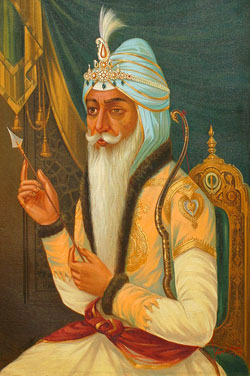Victor Jacquemont writes about the Maharaja
Born in Paris on August 8, 1801, Victor Jacquemont was the youngest of four sons of Venceslas Jacquemont and Rose Laisné. Jacquemont traveled to India in 1828, and remained there for the rest of his life. While he was there he met Maharajha Ranjit Singh at Lahore in 1831. He was a scientist and wrote his observations in the form of letters that were later translated into English. Several plants are named for him, including Acacia Jacquemontii , the Himalayan White Birth (Betula jacquemontii), the Indian Tree Hazel (Corylus jacquemontii), and the cobra lily or Jack in the Pulpit (Arisaema jacquemonti) . He died of disease in Mumbai on December 7, 1832.

The following are excerpts from his writing, The Punjab a 100 years ago.
"After a mile or so around the city( Lahore) over bad roads and through gardens, fields and ruins, we arrived at a camp of regular infantry ; this was Ranjit's bodyguard. We alighted near some beds of poppies, larkspurs and wall flowers which surrounded a cottage made of straw in the Chinese style with a little tent of red and white stripes in front of it; this was rajah's headquarters. Group of sikh officers and servants were seated in this rustic garden; we were conducted to the seat of the King which was no more magnificent than that of the rest. Ranjit was seated on a cushion in the sun on one of the garden paths; a servant standing behind him chased away the flies with the end of his waistband. on His right and left were a dozen of sardars squatting on a persian carpet near rajah. I saluted him when some paces away raising my hand to my forehead and he replied in the same manner but with rising.I advanced to the carpet and prsenting a nazzar of 21 ducats was commencing a complimentary speech, when he bade me sit down quite near him; and, without waiting for the end of my discourse, asked me how i was and if i was not tired by the journey, and assured me how pleased he was to see me. He spoke in Hindustani which understood very well, and he quite understood all the frowning pharases which i had prepared for the commencement of the interview e.g." i had often heard of his renown, his courage, and his wisdom. i had often seen Bonaparte and i for some time i had desired to see Bonaparte of the east( here ranjit bowed most affably) . All my desires were fulfilled in finding myself in his presence."
Naunihal singhs in Amritsar whom he calls akalis:

" the akalis, or immortals, are properly speaking sikh faqirs. Their rule compels them to be dressed in blue and always to carry arms. The sacred pol at Amritsar is their headquarters, but they often spread themselves over the punjab in large and formidable parties. Ranjit wisely turns their ferocity to his own advantage. He enlists them in his armies and employs them preferably against Mussalman enemies. He has at the moment 4,000-5,000 of them in the army. which he maintains at Attock, ready to march against another fanatic Syed. I have only seen two of them in the streets of Amritsar; it was evening and the matches of their muskets hung ready lighted. I had never seen more sinister looking figures."
